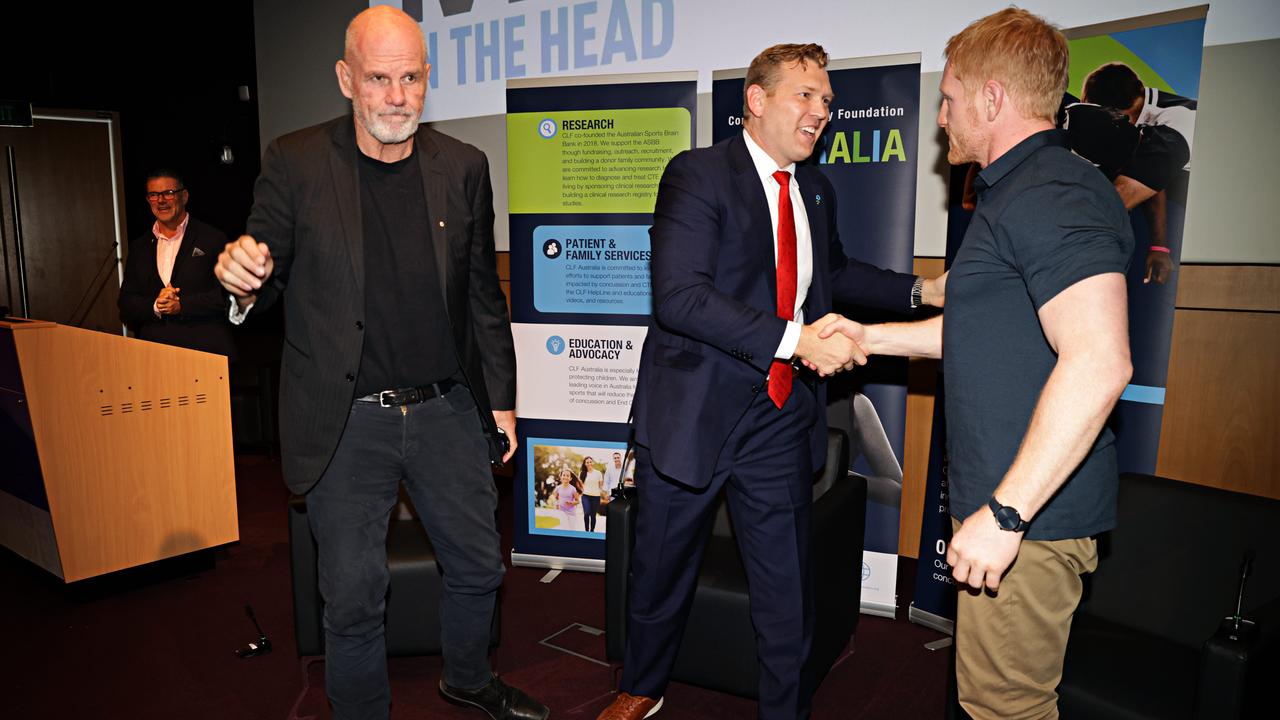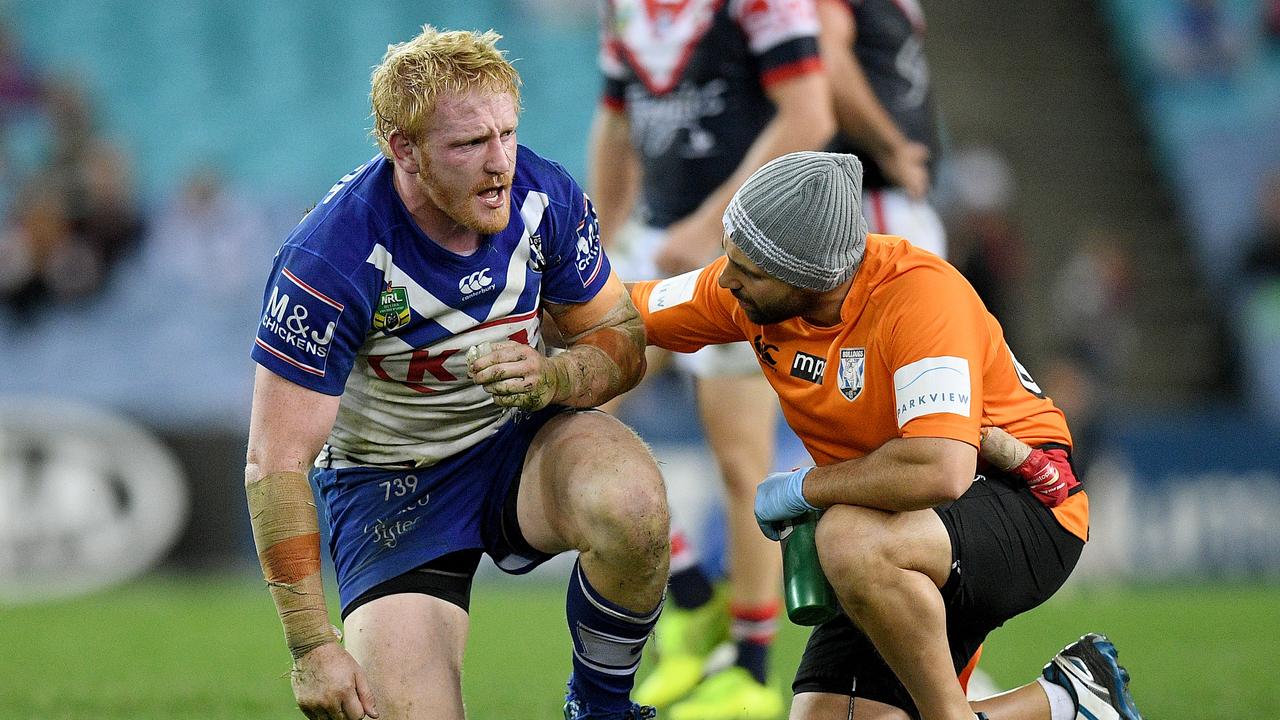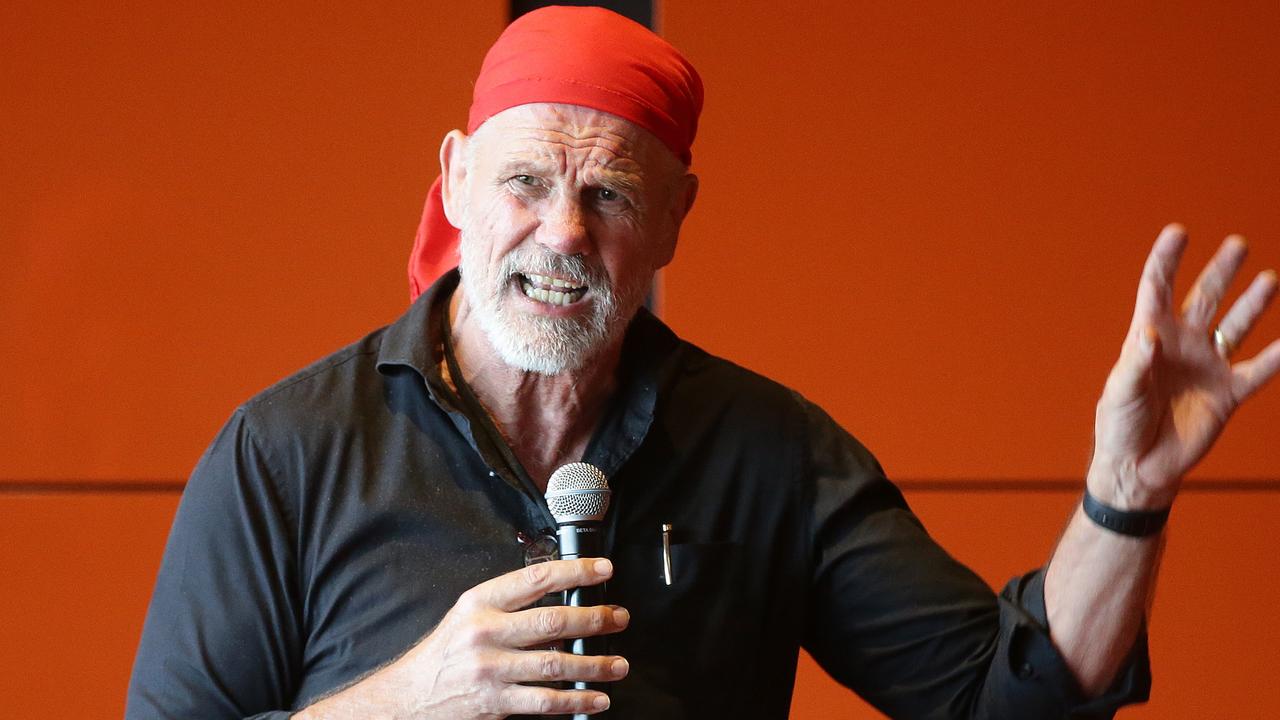Peter FitzSimons reignites head injury feud with James Graham
Former Wallaby and columnist Peter FitzSimons and former NRL hardman James Graham have had another tense exchange over an issue close to both men.
NRL great James Graham has revealed he was left “astonished” after former Wallaby-turned-columnist and author Peter FitzSimons called him out over his stance on concussions.
Throughout his career, the former St George Illawarra and Canterbury Bulldogs star long spoke about how one of the unavoidable by-products of playing a collision sport like rugby league was head knocks.
Stream every game of every round of the 2022 NRL Telstra Premiership Season Live & Ad-Break Free During Play on Kayo. New to Kayo? Start your free trial now >
But Graham has launched a new podcast with The Australian called Head Noise, investigating concussion and head injuries, as his stance on the issue continues to evolve.
In the first episode, Graham, who played 423 between the UK Super League and NRL as well as a further 53 games in international football, revealed he had 18,000 hits in his career and 100 concussions.
Concussion has become a massive issue in sport with several former contact sports athletes having been found with evidence of Chronic Traumatic Encephalopathy (CTE) which is believed to be caused by repeated blows to the head.
Although only able to be diagnosed after death, the disease can include symptoms such as short-term memory loss, changes in mood including depression, and outbursts in anger, and confusion and disorientation.
FitzSimons has long been a critic of concussion issues in contact sports.
At the launch of the Australian arm of the Concussion Legacy Foundation, of which Graham is a board member, FitzSimons called out the former NRL star during a panel discussion, The Australian reported.

During a 30-minute discussion, FitzSimons repeatedly called Graham out.
FitzSimons reportedly asked Graham: “Maybe for me, the meaning of life was finding something worth dying for. Was that rugby league?”
He also challenged Graham’s views on concussion from previous media appearances.
“May I ask a question … I think it was on NRL360, you said something like, well look, to not show weakness to the opposition, just to make it look like I didn’t care, and you also said, really strong comments and Benji Marshall was shocked and you said ‘look, I have to find a purpose in life and maybe to find something worth dying for’.
“You said that you prioritised the present over the future the idea that you went super hard at football now, even if that was going to damage the future. Do you stand by those remarks now?”
Graham replied: “I am not going to betray my former self. That’s who I was.”
FitzSimons also questioned whether Graham, armed with the information he has now, would have conducted his career differently if he was able to speak to his 22-year-old self.
The Australian reported the pair shook hands and embraced after the discussion but that the tension was clear.
Graham said he was taken aback by the incident.
“I am astonished he attempted to make it about me and him,” Graham said. “I was hoping to talk about the Concussion Legacy Foundation being launched in Australia; however, Peter wanted to dig up the past. I am in shock.”

Graham and FitzSimons have long been at loggerheads.
In 2019, Graham said he was willing to accept the risk of head injuries in order to continue to play the game he loves.
“It’s my life, I’ll do what I want to … well, within certain realms,” Graham said at the time. “What’s the alternative? I kind of like what I’m doing. The consequences of that are sometimes you get hit on the head.
“You’ve got to go and play Oztag if you don’t fancy playing league anymore. But I wouldn’t get paid and I probably wouldn’t have as much fun.
“It’s my life … I have children, I know the importance of them having a father but I’m protecting myself as best as I can and doing all the research myself.
“I’ve done my research, I’ve had my tests done, I know what’s going on in my head and in my body. I’m seeing the appropriate people if there’s something to do about that but I’ll get on with it myself and stick to the laws of the game.”
FitzSimons responded by calling out the then-NRL star, urging him to not downplay the effects of repeated concussions.
“Yes, it is your life. But again, it is not about you. It’s about the hundreds of thousands in this country who play contact sport and the need for all of them to realise that while no one wants to shut down football, there are protocols that need to be observed to make it safer for everyone,” FitzSimons wrote.
“Comments like yours — basically, getting smashed in the head and getting on with it anyway is what goes with football — are outrageous. Serious people are trying to make the game safer, and it needs leaders like you to support that process and not be seen to downplay it.”
But Graham hit back: “I’m actually appalled by you paraphrasing my words ‘basically, getting smashed in the head and getting on with it anyway is what goes with football’. Sorry NO! I didn’t say that, mate. Complete fiction. If you think I said that maybe you are the one that needs assessing.”

Graham doubled down in 2021 after his retirement, adding he had to weigh up giving the game away for his brain health against the consequences of not playing the game he called “the be-all and potential end-all of my life”.
“Where was the purpose going to be filled in my life? I personally felt like I needed a cause,” Graham said on NRL 360. “I thought about what’s the meaning of life? Maybe for me, finding the meaning of life was finding something worth dying for.”
FitzSimons has long called out concussion issues in contact sports, including calling for the retirements of the likes of Boyd Cordner in 2020 and more recently Luke Keary, who is still playing for the Roosters despite long stretches out of the game after head injuries.
Cordner retired at 29 as a result of his concussion issues.
CTE has been found after the deaths of AFL greats Danny Frawley, Shane Tuck and Polly Farmer, while the NRL has also had at least two former players diagnosed with the disease, including legendary Canterbury player and coach Steve Folkes.
The Concussion Legacy Foundation was founded to support athletes, veterans and any one else affected by head injuries and was founded by former gridiron player and WWE wrestler Christopher Nowinski.
Nowinski has advocated for no tackling in junior sport before the age of 14.




